TAGGED AS: Comedy, Mystery, Peacock, streaming, television, TV
If there’s one thing Poker Face has taught us, the hook will always bring you back.
The Peacock series’ Certified Fresh first season aired is final episode — appropriately titled “The Hook” — on March 9. But it also set up a plot that will lure back Natasha Lyonne’s crime-solving Charlie Cale and the fans obsessed with learning which murders and attempted murders the human lie detector can suss out in each episode of the already-announced second season.
Spoiler alert: The following reveals plot points from the season 1 finale of Peacock’s Poker Face. Stop here if you have not watched through episode 10, “The Hook.”
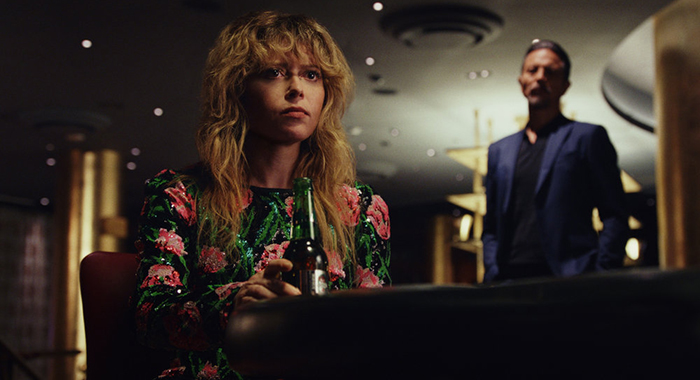
(Photo by Peacock)
And Charlie does have a knack for finding people who are willing to commit murder.
“That’s something, actually, that we talked about when we go in the first season is if there’s something that we can come up with that’s not necessarily murder that’s on the table,” series creator Rian Johnson told Rotten Tomatoes. “For whatever reason, we never ended up going there. Every single time we got into it, it was either murder or attempted murder. I guess that’s the gravity of these things.”
He added that he and showrunners Nora Zuckerman and Lilla Zuckerman are open to other crimes, but that so many of the series that are in Poker Face DNA — like Columbo or Murder, She Wrote — “are crime shows where somebody gets killed.”
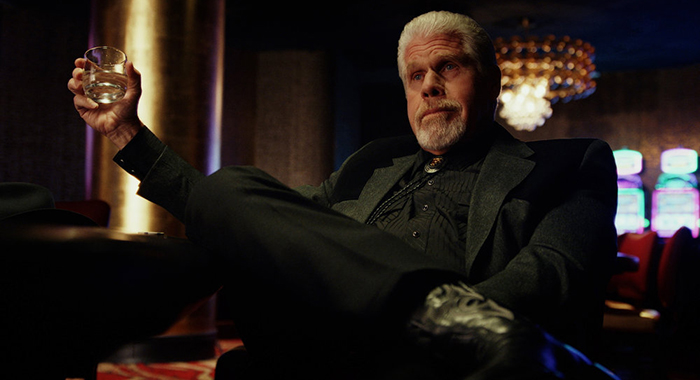
(Photo by Peacock)
In fact, the season’s last big kill is someone who has been chasing Charlie all this time: Sterling Frost Sr., Ron Perlman’s casino magnet. To be fair, he’d sent his henchman Cliff LeGrand (Benjamin Bratt) to do it.
Cliff was surprisingly easy to elude and that made him question his life choices — which, eventually, made Sterling very, very dead. Now Charlie has a new big bad on her back (Beatrix Hasp, played by Rhea Perlman, no relation to Ron) and another chance to run.
Before they could get away, Rotten Tomatoes talked to Johnson and Lyonne about this season and plans for the next. We hope they weren’t lying.
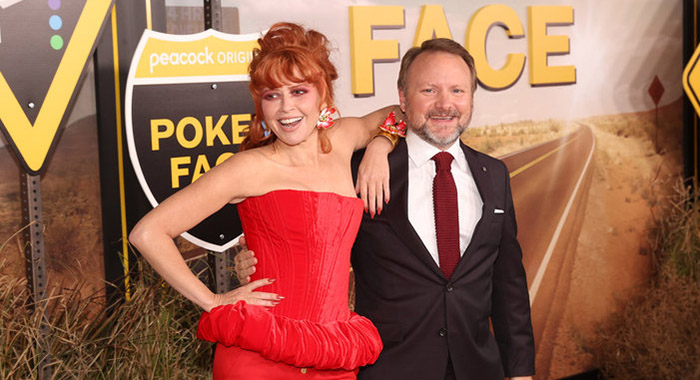
(Photo by Jesse Grant/Peacock)
Whitney Friedlander for Rotten Tomatoes: The actor who plays the new villain has a similar name to the one who played the old one. Was Rhea Perlman cast because her name sounds like Ron Perlman’s?
Rian Johnson: (laughs) No, total coincidence. We cast Ron first and then Rhea and then realized it.
The finale really wants you to remember that its title is called “The Hook.” You have someone watching the Robin Williams–Dustin Hoffman movie Hook and Bratt’s Cliff recites the Blues Traveler song “Hook.” Was that all in the script?
Johnson: It’s in the script … I literally just tried to get tiny little references throughout the entire thing … I’m very proud about the script for that episode. It’s both about the pop hook of episodic TV and, weirdly, zooming out for a second to look at a real person who’s living their life through through these pop [hooks].
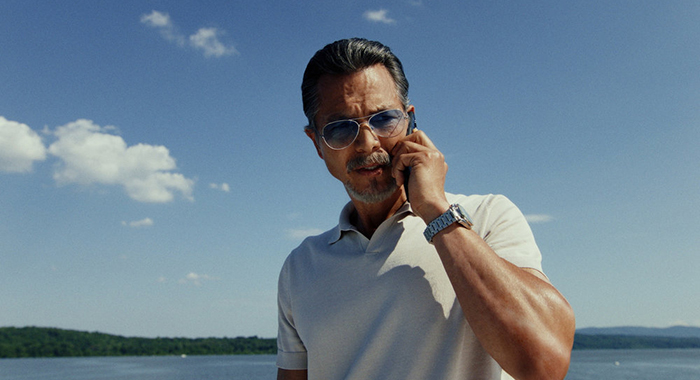
(Photo by Peacock)
Did Bratt know the Blues Traveler song?
Johnson: He had to learn it, poor guy. The way that Janicza shot that, I looked at that did the daily and I was just like, “Oh my god, this is the favorite thing I’ve ever been involved with.”
Is there a backstory to the rubber penis ring that gets stuck on Charlie’s finger when she crashes a bachelorette party and that keeps showing up in the episode?
Lyonne: I don’t know what to say other than that there is a text thread between myself, Janicza, and Rian about the ring that is one of my prized possessions.
Aside from a couple episodes, there’s really no ambiguity as to whether the victim, or almost victim, deserves to die. Usually, they’re pretty decent people and the answer is no. Was that a conscious choice? Will that be changing with the second season?
Johnson: As the episodes in season 1 unfurl, you can feel us testing the boundaries of this format and figuring out that we can give a familiar experience each time in that great episodic way but also genuinely surprise the audience. And, to me, that’s not about clever ways of killing people or clever devices for the plot. To me, what genuinely surprises is the audience’s perspective and empathy and shifts of empathy; those, to me, are the tidal waves underneath the surface of the ocean that actually make an episode engaging.
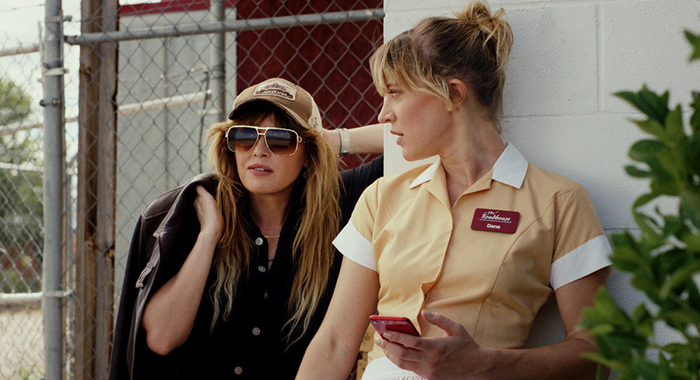
(Photo by Peacock)
Charlie also spends the majority of her time in middle America and working lower-income jobs. That’s not something we usually see on TV. Why was that important to show?
Johnson: That, to me, was something [I wanted] from the very start. And that’s part of the reason why I wanted it to be a road show; why I wanted to get Charlie on the road and living off the grid. I’d just made a movie, Glass Onion, which is in that very fancy world of rich people. And exploring the corners of America that aren’t generally on television seemed, to me, much more interesting.
Did that also make it difficult to figure out what jobs she could take?
Johnson: Sometimes. But what we would generally do is figure out the venue of a little world that we wanted to explore. Sometimes we would have to choose something obvious because it makes sense. But I was always looking for what were interesting side ways that we can get Charlie involved in this world. Typically, that’s secondary. Typically, we’d come up with the world, and we come up with kind of the story, then we figure out, “OK, how does it make sense for Charlie to be involved with it?”
But we also play with that going forward in the story. That’s the other thing that kind of is fun; to mess with what the audience has an expectation of. “Oh, it’s this world. So Charlie will be working there.” And, then, to have some other way in is fun to do.
Did you give thought as to how she decides where to go?
Johnson: We let her nose lead us in terms of what were interesting worlds. For me, for instance, there’s a deep dive into into barbecue [in episode three]. When I visit Austin, I drive out and I go to [legendary Texas barbecue spot] Salt Lick or whatever. As a casual observer, this is an interesting way to do a Mr. Rogers–style episode into how it works … that’s the selfish, secondary thing of these is picking little corners of the world that I’m not familiar with and let’s learn about them.

(Photo by Phillip Caruso/Peacock)
How do you decide the tone and look for each episode? Episode 9 feels like an ode to Black Mirror and also has shots in the style of Breaking Bad (which Johnson also worked on). Episode 8 is very Hitchcockian.
Johnson: We really try and shake it up with each one. Just in a vacuum, if you looked at the Ellen Barkin–Tim Meadows theater episode [“Exit Stage Death”], and the “Escape from Shit Mountain” episode, the notion that those both exist in the same series seems ridiculous. What I hope is that the episodic nature of it, and the fact that one of the other tools in our belt for surprising and thrilling the audience every week, is that within the confines of this structure, tone is another thing that we can take wild swings in different directions.
Lyonne: Each one really is a world unto itself. And, of course, that’s what makes the show so fun. It’s such a hard and beautiful work from the the various department heads. It’s a real undertaking; they’re 10 individual worlds, top to the bottom.
Your production designer was especially integral to pulling all of this off.
Lyonne: Judy Rhee! I only knew it just from producing and starring in a week-to-week, but to work with her at that level on this particular episode, episode 8, “The Orpheus Syndrome,” with the amount of detail work and bills and sort of, you know, coordinating with the [visual effects supervisor] Phil Tippett’s team to build out all these creatures and monsters … and I wanted [to wear a costume horse head that was inspired by] the horse from the Jean Cocteau movie, Testament of Orpheus. It’s just bananas; the work that’s going into it. The horse actually, Trayce Gigi Field did that — 0ur costume designer, who is also extraordinary.
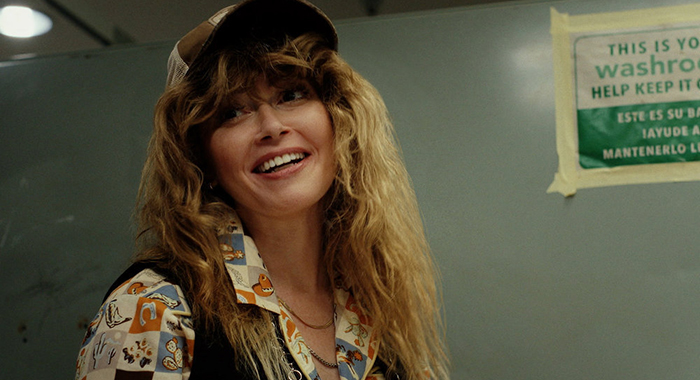
(Photo by Peacock)
Charlie is a character who has, and does, suffer significant trauma. Natasha, how do you find ways to include levity in a story such as this?
Lyonne: I always think it’s useful to have a personal life experience to draw on, because I would say, on a personal basis, I’ve been in quite a few high-stakes situations. It’s almost like what you’re trying to do is not show the world that you’re in a state, rather than telegraph to every gas station you go to like, “Hey, man, I’m in a panic.”
It’s so funny the ways in which we view male and female characters. We’re making great strides, but we would never expect Humphrey Bogart when he’s playing a Philip Marlowe–style character to look like he’s on the verge of a nervous breakdown. We’re still catching up to the idea that a woman could have an inner thought life that is extreme without showing it on the outside. Something that was key to my set of goals as a teenager who was falling in love with like cinema of the ’70s was to find a way to play female characters that felt more like Martin Sheen in Apocalypse Now. You know, the opening scene when he’s looking up at the fan, and I don’t know what he’s thinking until he stands up and is covered in blood and The Doors are playing, and I’m like, “Oh, shit, I guess that’s what he was thinking.” I always made it a personal goal to get to be like the boys.
How do you decide how, or if, to tell Charlie’s backstory? The season finale suggests that she has some family issues tied to her gift for knowing when people are lying.
Johnson: In the finale, we get a little into it. In kind a meta way, the finale is about the fact that the show is an episodic show. It’s a little bit about the format of the show, in a weird way. My attitude toward it going forward into the next coming seasons is if an idea comes up where it’s interesting and it’s entertaining and it makes sense, I’m not a hundred percent against it. But it’s hard for me to picture the interesting version of seeing something from her childhood that gave her the gift or something. To me … it’s just the premise of the show … and the meat of the show is actually the case work. That, to me, is a lot more interesting than some backstory about something she did as a kid where she got this power.
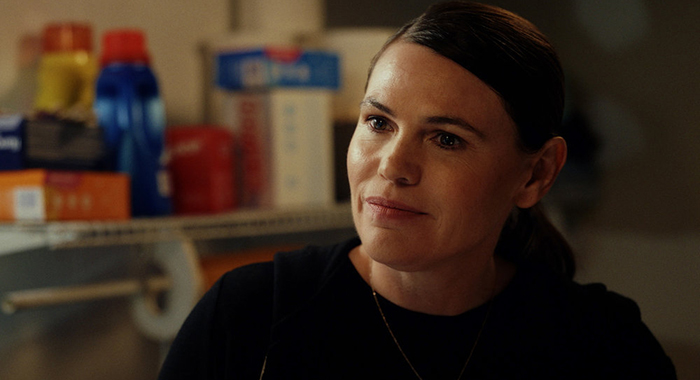
(Photo by Peacock)
Speaking of meta-ness, I was not expecting the finale to have a But I’m a Cheerleader reunion where Lyonne’s co-star from that movie, Clea Duvall, plays Charlie’s sister. How do you cast a series like this that has so many famous guest stars without putting too much attention on that?
Johnson: That’s a function of the Clea and Natasha just being really good friends, and it’s the same thing with [her friend] Chloe Sevigny being in the fourth episode, and, with me, Joseph Gordon-Levitt in the [ninth] episode and Adrien Brody in the pilot. You, kind of, call up your friends. Especially in the first season where you’re nervous and you’re trying to figure out what this thing is; it really helps to have people that you trust and love around you that you can work with.
With someone like Joe, he’s just such a good actor. I think he could do anything. I guess you could make the case that this is against type for him, the part that he plays [a villain, while he usually plays nice guys]. I’m generally not thinking in those terms.
Lyonne: It’s definitely not a coincidence [that so many of our friends are in the show]. It makes the work a lot richer and deeper and people can take bigger risks and you can get to more eccentric places quicker because there’s a trust factor built in … Rian had all that history with Joseph Gordon-Levitt. We shot episode 9 first, and it was this great comfort for me and Rian that he was there, and we felt like he knows the vibe. We both love Rian so much and would trust anything he would do. There was never any sense of like, “Why are we doing this thing?”
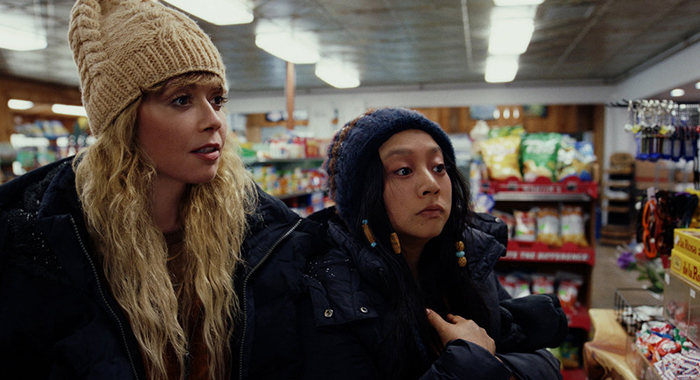
(Photo by Peacock)
Natasha, how did filming the ninth episode — when Charlie’s been on the lam for some time and seen an awful lot of murders — effect your character continuity? Also, that’s a physical episode because Charlie is hit by a car and buried alive before she has to claw herself out to safety.
Lyonne: Weirdly, it was a relief. I work very hard to make it seem like my characters are very casual. All the references for Charlie are Peter Falk [in Columbo] and Gene Hackman in Night Moves and Jeff Bridges in The Big Lebowski and Elliott Gould in The Long Goodbye — all characters that are very relaxed or in a state of relaxation. So, weirdly, what was so useful about doing [episode] 9 first is that you could transpose that nervousness of doing the first episode of this big series into actually her situational environmental concerns. Then, by the time we got to episode 1, where she needed to seem so lived-in, we were just a little bit more caught up to that lazier attitude that we knew we wanted for the whole season, which was Charlie in her resting state.
And, something I recommend for all other actors: Always do your first episode of the season fully covering your face and mud. That way, nobody can even see your performance. So it’s just a little something to think about, like Juilliard and stuff.
Rian, are you worried about typecasting yourself? You did two Knives Out movies, which are whodunnits centered around Daniel Craig’s detective Benoit Blanc, and you are doing this show.
Johnson: (laughs) A little bit. Right now, I’m about to start writing my next movie and the strategic part of my brain feels like it would make all the sense in the world to do something completely non-mystery related next. But I’ll tell you the truth — I mean, if there’s one career thing I feel like I’ve accidentally gotten right it’s to always follow your heart in terms of what you’re most interested in next and not to think strategically, and right now, the thing I’m most excited about is writing another Benoit Blanc movie … I’ve got a cloud of ideas. And most importantly, I’ve got a tone and a notion of, conceptually, what I want the thing to be. It’s very different than Glass Onion … I’m very, very excited about it.

(Photo by Peacock)
Natasha, between this and shows like Netflix’s Russian Doll and Orange Is the New Black, are you actively trying to find projects where there’s wordplay in the titles?
Lyonne: Certainly not intentionally; that is sheer coincidence. But things that are many layers make me happy.
Would you ever use the Lady Gaga song “Poker Face” in your show?
Johnson: I wouldn’t rule it out. If we do it, we’ll have to figure out a fun way to do it.
Have you begun to sketch out the second season of Poker Face?
Lyonne: We have been having some conversations that have been pretty fun, and I can’t tell you a goddamn thing.
![]() 98%
Poker Face: Season 1
(2023)
is now streaming in its entirety on Peacock.
98%
Poker Face: Season 1
(2023)
is now streaming in its entirety on Peacock.